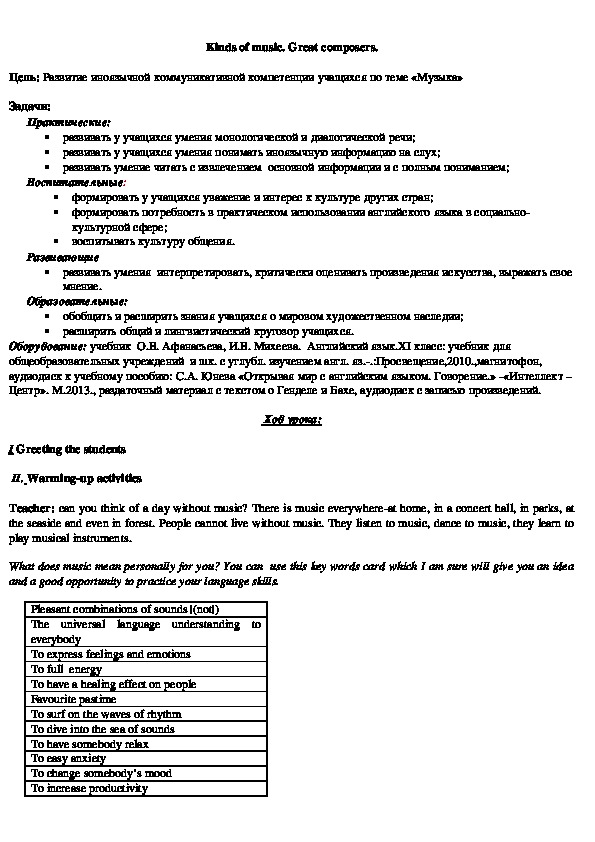Разработка урока английского языка " Kinds of music" 10 класс
Разработки уроков
docx
английский язык
10 кл
31.05.2017

Урок разработан для учащихся 10 класса, занимающихся по учебнику О.В. Афанасьева, И.В. Михеева. Английский язык.XI класс: учебник для общеобразовательных учреждений и школ с углубленным. изучением англ. яз. Цель урока-развитие иноязычной коммуникативной компетенции учащихся по теме «Музыка». На уроке реализуется личностно-ориентированный подход в обучении.
Kinds of music.docx
Цель: Развитие иноязычной коммуникативной компетенции учащихся по теме «Музыка»
Kinds of music. Great composers.
Задачи:
Практические:
развивать у учащихся умения монологической и диалогической речи;
развивать у учащихся умения понимать иноязычную информацию на слух;
развивать умение читать с извлечением основной информации и с полным пониманием;
Воспитательные:
формировать у учащихся уважение и интерес к культуре других стран;
формировать потребность в практическом использовании английского языка в социально
культурной сфере;
воспитывать культуру общения.
Развивающие
Образовательные:
развивать умения интерпретировать, критически оценивать произведения искусства, выражать свое
мнение.
обобщить и расширить знания учащихся о мировом художественном наследии;
расширить общий и лингвистический кругозор учащихся.
Оборудование: учебник О.В. Афанасьева, И.В. Михеева. Английский язык.XI класс: учебник для
общеобразовательных учреждений и шк. с углубл. изучением англ. яз..:Просвещение,2010.,магнитофон,
аудиодиск к учебному пособию: С.А. Юнева «Открывая мир с английским языком. Говорение.» «Интеллект –
Центр». М.2013., раздаточный материал с текстом о Генделе и Бахе, аудиодиск с записью произведений.
Ход
урока
:
I Greeting the students
II. Warmingup activities
Teacher: can you think of a day without music? There is music everywhereat home, in a concert hall, in parks, at
the seaside and even in forest. People cannot live without music. They listen to music, dance to music, they learn to
play musical instruments.
What does music mean personally for you? You can use this key words card which I am sure will give you an idea
and a good opportunity to practice your language skills.
Pleasant combinations of sounds |(not|)
The universal language understanding to
everybody
To express feelings and emotions
To full energy
To have a healing effect on people
Favourite pastime
To surf on the waves of rhythm
To dive into the sea of sounds
To have somebody relax
To easy anxiety
To change somebody’s mood
To increase productivity III. Practice of listening
Read the sentences AH, listen to the dialogue and fill in the gaps with the sentences AH.
Ron Do you like listening to music, Cindy
Cindy I’m fond of listening to music. It plays a very important role in my life. I like listening to music, dancing to it,
visiting concert halls, singing and 1 . Music gives me aesthetic pleasure and a better understanding of many
things.
Ron I like listening to music too. I’m fond of electronicallyproduced music because it fills me with happiness and
excitement. I’ve fond 2 .I often use online communities like YouTube and Facebook because they help me
connect with other musicians , 3 .
Cindy That’s great! I like listening to music online too.
Ron I think music has 4 . Many people say that music is a universal language.
Cindy I can’t disagree with them. A composer speaks to us without 5. Music is understandable to
everybody no matter what language a person speaks. So I think it has the power6.
Ron |but people have different tastes in music, which may lead to –7.
Cindy you’re right. Still, I can’t imagine the world without music. It influences our emotions and 8 .to my
mind, life without music would be less joyful.
A. a significant impact on our lives
B. playing musical instruments
C. misunderstanding between them
D. download and listen to MP3s and create my own
E. a great source of energy and inspiration in it
F. using any words
G. makes me happier
H. to unite people all over the world
IV. Announcing of the objectives of the lesson
There are two major traditions of music, generally known as classical and popular, although the line between them
is not always clear. The term classical music is often used to describe the long tradition of serious music from the
European Middle Ages to the present. The classics are often associated with orchestral music, but they also include
solo music for instruments, opera and choral music. Today we are going to analyze different kinds of classical music,
learn more about the two great composers and have a talk on their biographies and creative works.
V.Informative reading (Work with the textbook)
Will you take you books and find the exercises 53 on page 52. Look through the text «Kinds of Music», find the
main periods in the development of music and their characteristic features.
(Students scan the text)
VI .The use of the new knowledge
So, you’ve finished your research work, you’ve found the characteristic features of different kinds of classical music,
and I’m sure that now you can name the composers connected with different periods in the history of music.
Look at the screen and match the names of the composers with the periods in the history of music . What are the
characteristic features of every period?
VII. Speaking practice Listen to two pieces of music and say what feelings this music arouses. Use this key words card to make your speech
more emotional. Can you guess the names of these works, their genres and the composers who created them?
( students listen to two oratories by Handel and Bach, express their feelings, try to guess the names of composers)
to conquer ( our hearts and feelings)
to inspire
to appeal to
to give somebody creeps
to make happy (sad)
to bring memory
to picture in ones mind
to provoke the picture
to impress
to sound
IX. Reading for discussing
divine
expressive
harmonic
serious
dramatic
daring
complex
imaginative
lively
mystical
During the celebrations music critics once more turned to the biographies of Handel and Bach and
compared their music careers. The critics thought that such comparison was possible and permissible as
Bach and Handel had been compatriots and contemporaries and both had turned to the same music genres.
Analyzing their music careers, the critics pointed out how different their lives had been.
Will you read a text about their musical career and find if these sentences are true or false
Handel’s most successful works were oratorios
His operas were appreciated in England
Handel’s oratorios were the greatest contribution to European music
Handel’s musical career was much more successful than Bach’s career
Bach’s music was highly appreciated by his contemporaries
Bach was a great organist
His music is highly emotional and truly romantic.
Both of them were great improvisators
THE GREAT TWO OF THE 18TH CENTURY
Handel was born in Germany in 1685. He had a long and successful career of a composer first in Italy, then in
Britain. He composed operas and oratorios making the chorus his main instrument. Handel's first oratorio in English
— "Esther" — began the tradition of oratoriosinging in England. However Handel's ambition was to write operas.
For 20 long years he kept on composing and staging operas though none of them was a success with the public. 11 is
creative principles were too unconventional. Handel took his failure very much to heart, but he hoped that future
musiclovers would appreciate them. Only when Handel gave up writing operas and devoted himself to oratorios,
he finally won general acclaim. His contemporaries realized that Handel had found a perfectly new type of music
epic. Music critics wrote that oratorio form, which combined the elements of a musical drama and choral singing,
was Handel’s greatest contribution to European music. In 1742 Handel composed his most inspired oratorio
"Messiah" which was warmly received at the Covent Garden Theatre in London. It was a real triumph.
Johann Sebastian Bach was also born in 1685. But his life and music careerг were much less
triumphant. Handel was already a celebrated composer when Bach was only a modest violinist in the Weimar
orchestra. When Handel was applauded to in Italy and in England Bach was an organist in a small German town.
Handel used to live at the English Court, having the best chorus, orchestra and soloists, while Bach was a school
teacher, teaching children to music. In his lifetime Bach was recognized mainly as a virtuoso organist, and his
music was appreciated only after his death. Bach was a welleducated man of versatile interests. He had a rare gift
for languages, he could speak a number of them and even taught Latin at school. He was fond of children and had a
large family. He was very good at poetry as well.. Although nobody had ever taught him to play either the
harpsichord or the organ and he had had a teacher neither in harmony nor composition, Bach could play different
instruments very well. It always took him a long time to compose a piece of music as he used to perfect it over and
over again. His music is highly emotional and truly romantic.
Both Handel and Bach were brilliant improvisators and used to take part in musical competitions of virtuosos.
The music of Handel and Bach constituted a whole epoch in polyphonic styles, the main representatives of which
they both were.
X. Speaking practice Now it’s time for a roleplay. Present the new information about two great composers in the form of a dialogue
between two classic music fans.
XI. Reflection on personal experience
Do you think you’ve got any new knowledge at the lesson? Can you use it? So, you can match the names of the
composers with the periods in the history of music now and can’t you?
XII. Summing up
Your homework for the next lesson is to prepare a presentation about one of the famous composer of the past. You
marks today…(giving marks)
Have you any questions? So, I wish you good luck!
Материалы на данной страницы взяты из открытых истончиков либо размещены пользователем в соответствии с договором-офертой сайта. Вы можете сообщить о нарушении.
31.05.2017
Посмотрите также:
© ООО «Знанио»
С вами с 2009 года.
![]()
О портале

